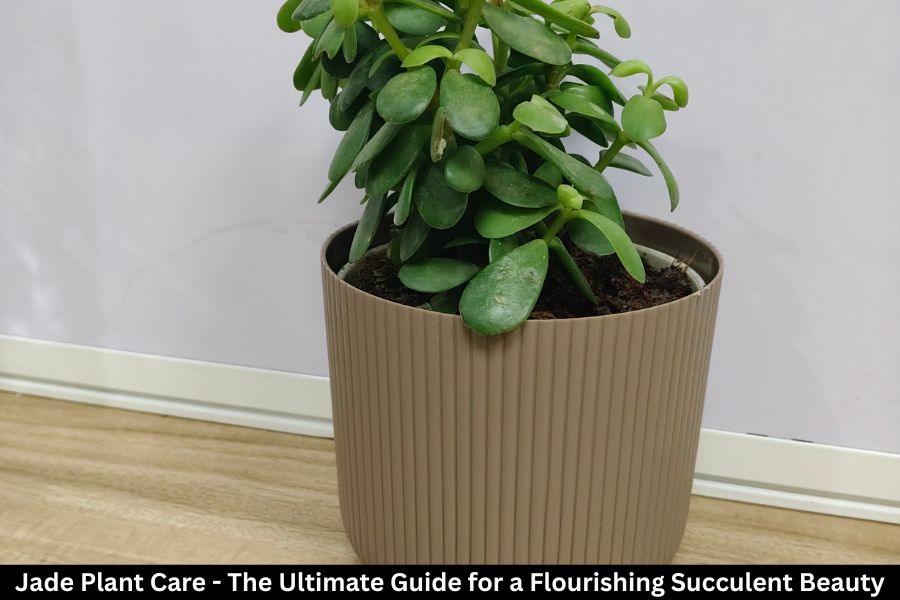A Jade Plant, also known as Crassula ovata, is a popular succulent loved for its thick, glossy, oval-shaped leaves and tree-like appearance. It’s easy to care for, long-living, and perfect for both beginners and experienced plant lovers.
Why Jade Plants Are Loved Worldwide
People adore jade plants because they’re beautiful, symbolic, and incredibly forgiving. They thrive with minimal care, add charm to any space, and are believed to attract prosperity—making them a favorite in homes and offices.
Understanding Jade Plant Characteristics
Appearance and Growth Habits
Jade plants grow slowly but steadily, developing woody stems and lush green foliage. They can grow upright like a tiny tree or be trained into various shapes with pruning.
Natural Habitat and Climate Preferences
Native to South Africa, jade plants thrive in dry, sunny environments. They store water in their leaves, making them resilient during droughts.
Common Varieties of Jade Plants
There are several beautiful varieties:
- Classic Crassula ovata – the traditional jade
- Gollum Jade – tubular, finger-like leaves
- Hobbit Jade – curled, unique foliage
- Miniature Jade – compact and perfect for small spaces
Compact Jade, Gollum Jade, and More
Each variety has its charm, but they all share similar care needs—sunlight, proper watering, and well-draining soil.
Essential Jade Plant Care Requirements
Light Requirements
Jade plants love bright, indirect sunlight. Ideally, they need:
- 4–6 hours of light daily
- East or south-facing windows
Too little light makes them leggy, while too much direct sun can cause leaf burn.
Watering Needs
The rule is simple: less is more. Since jade plants store water, they don’t need frequent watering. Let the soil dry out completely before watering again. Overwatering is one of the biggest reasons jade plants struggle.
Soil and Potting Mix
A well-draining soil mix is crucial. Choose:
- Cactus/succulent mix
- Perlite or pumice added for extra drainage
Temperature and Humidity Levels
Jade plants prefer:
- Temperatures between 65°F–75°F (18°C–24°C)
- Low to moderate humidity
They can tolerate short periods of cold but should stay away from frost.
Choosing the Right Pot
Pick a pot with drainage holes. Terra cotta pots work best because they help dry the soil faster.
How to Grow a Healthy Jade Plant
Proper Feeding and Fertilization
Feed your jade plant during the growing season (spring and summer) with a balanced, diluted liquid fertilizer once a month.
Pruning for Shape and Growth
Pruning helps create a fuller, bushier plant. It also encourages new branches and maintains a compact shape.
Repotting Your Jade Plant
Repot every 2–3 years. Look for signs like:
- Roots circling the pot
- Slow growth
- Soil that no longer drains well
Repotting gives your jade fresh nutrients and room to grow.
Training Your Jade as a Mini Bonsai
By pruning strategically and wiring branches, you can transform your jade into an adorable mini bonsai—it’s fun, artistic, and surprisingly easy.
Propagating Jade Plants
Leaf Propagation
Gently twist off a healthy leaf, let it dry for a few days, and place it on top of the soil. With time, roots will appear.
Stem Cutting Propagation
Cut a small section of the stem, allow it to callous, then plant it in well-draining soil. Stem cuttings root faster and grow stronger.
Tips for Successful Propagation
- Always sterilize cutting tools
- Allow cuttings to callous
- Keep soil lightly moist—not wet
- Provide bright, indirect light
Common Problems and How to Fix Them
Overwatering Issues
Signs of overwatering include:
- Yellow leaves
- Mushy stems
- Falling leaves
Solution: Let the soil dry out completely or repot if needed.
Wrinkled or Drooping Leaves
This usually means underwatering. Give your jade a deep drink and adjust watering frequency.
Pests That Affect Jade Plants
Common pests include:
- Mealybugs
- Spider mites
- Scale insects
Wipe pests off with alcohol-dipped cotton or use insecticidal soap.
Root Rot Prevention and Treatment
Root rot happens when the soil stays wet too long. Save your plant by trimming off damaged roots and repotting in dry, fresh soil.
Seasonal Care Tips
Summer Growth Season Care
During summer, your jade grows fastest. Increase watering slightly and feed monthly.
Winter Dormancy Tips
Jade plants rest in winter. Reduce watering and avoid fertilizing during this time.
How to Encourage Blooming
Give your jade:
- Cooler nights in winter
- Plenty of sunlight
- A consistent care routine
With patience, it may surprise you with white or pink flowers.
Styling and Display Ideas
Indoor Décor Ideas
Jade plants look amazing on:
- Office desks
- Bookshelves
- Window sills
- Minimalist décor spaces
Jade Plants for Feng Shui
In Feng Shui, jade plants symbolize wealth and prosperity. Placing them near your entrance attracts positive energy.
Creative Potting Options
Use:
- Ceramic pots
- Wooden planters
- Decorative clay pots
Choose colors that complement the jade’s vibrant green leaves.
Why Jade Plants Make Great Gifts
Symbolism of Prosperity and Good Luck
Jade plants are known as “money plants” and symbolize growth, fortune, and abundance—perfect for gifting.
Low-Maintenance Nature for Beginners
Even those without a “green thumb” can successfully care for a jade plant, making it thoughtful and practical.
Conclusion
Jade plants are beautiful, resilient, and full of positive energy. With the right care—sunlight, proper watering, well-draining soil, and occasional feeding—you can enjoy a flourishing jade plant for years. Whether you’re drawn to its symbolism, its easy-going nature, or its sculptural beauty, one thing is certain: caring for a jade plant is deeply rewarding.
FAQs
1. How often should I water my jade plant?
Water only when the soil dries out completely—usually every 2–3 weeks.
2. Why are my jade plant leaves turning yellow?
Yellow leaves often signal overwatering or poor soil drainage.
3. Can jade plants survive in low light?
They can survive, but they won’t thrive. Bright, indirect light works best.
4. What is the best potting mix for jade plants?
Use a well-draining succulent or cactus mix with added perlite or pumice.
5. How do I make my jade plant grow faster?
Provide plenty of sunlight, proper watering, and monthly feeding during the growing season.




